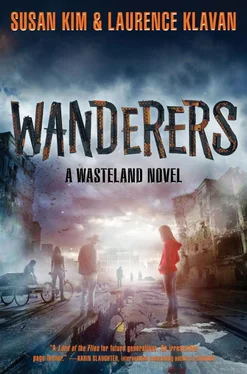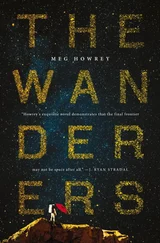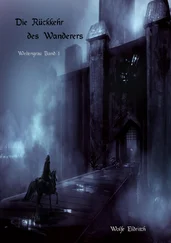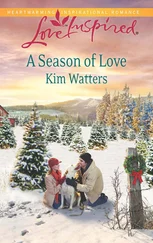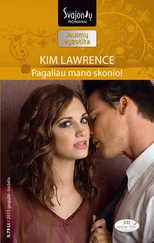Esther took the necklace, still warm from Skar’s touch, and closed her fingers around it. Then she slipped it into her pocket for safekeeping.
“Thank you,” she said.
If Esther could have had her way, she and Skar would have spent their final afternoon roaming through the fields and talking, the way they had for so many years. But now, there was no longer any time; there was too much work to do. Skar helped Esther secure belongings in the back of their wagon. They lashed everything down with elastic cords, stretchy pieces of rope that were covered with braided nylon and ended in sturdy hooks tipped with white rubber. They packed with care, piling the items close together and then compressing them even further.
When they were finished, there was a final task: collecting more of the town’s most precious resource, water. An hour later, the two girls were at the spring located beneath Joseph’s former home, a hotel on the far side of town.
Esther, with her sneakers off and jeans rolled up to her knees, stood in the achingly cold water, filling one plastic gallon jug after another and handing them to Skar, who replaced their caps. Working together, the two had already loaded one wagon, child-size and made of red metal, and were nearly finished with the second. Both were attached to the girls’ bicycles, which stood side by side.
The afternoon sun was strong, and Esther took a moment to dip her hands into the icy spring and lift them to her lips to drink. Then, taking off her sunglasses, she undid her red hood and leaned forward, plunging her head under. The effect was exhilarating and when she emerged, water running down her face and neck, she let out a whoop of sheer pleasure. Then she shook her head like a dog, so the drops flew.
Skar laughed, too, and jokingly held up her hands to guard against the unexpected shower. Esther bent low and slapped her hand across the spring’s surface, sending up an arc that splashed the variant girl.
“Hey!” shouted Skar.
Then she too waded into the water and began churning up a counterattack. Laughing and shouting at the cold, the two girls thrashed at the water, dousing each other and getting soaked in turn. It was an epic fight, one in which all of the day’s weariness and tension, unspoken and unyielding, seemed to be swept away by the bracing water and their shared screams of laughter.
Finally, the two waded to dry land. Still panting, they sat together, attempting to wring water from their sodden clothes. It was no good. Esther yanked handfuls of dead, sun-bleached grass from the ground beside her and tried without much success to wipe herself dry. Laughing, she turned to her friend to offer her some, as well. But what she saw made the words die on her lips.
There were dozens of bruises and welts.
Multicolored and vivid, they stood out on Skar’s flesh, where the concealing clay had been washed away. One radiated from her upper chest like a spider’s web of broken capillaries and blood vessels. A large handprint, tinged purple and yellow, circled her soft throat, and others dappled her arms like bracelets, the mark of individual fingers dark and distinct. A bruise across her shoulder seemed recent: It was an angry red, and its swollen welt glistened with fresh blood.
Esther let out a cry.
Skar, unaware of what her friend had seen, turned to her with a quizzical expression. When she saw the open shock on Esther’s face, she gave a start, as her hands flew to cover her throat and arms.
“Skar,” said Esther. She found she could barely speak. “What has he—”
“No,” interrupted Skar. She sounded panicked. “This isn’t what you think. I’m too clumsy and fell when I was hunting.” But her face flushed at the obvious lie as she tried in vain to scrape up more mud with which to cover herself.
“Don’t,” said Esther.
She took the variant girl by the wrist. At her touch, gentle as it was, Skar winced, her face contorted in pain. As she let go, Esther realized with a sick feeling why her old friend had been avoiding her embrace all these times.
Skar gave up trying to cover herself. Instead, she drew her knees up to her chin and buried her face in her hands.
“Please don’t look at me,” she whispered. Her voice was muffled.
Esther crouched by Skar. “You can talk to me,” she said.
Skar wouldn’t take her hands from her face. “Only if you look away,” she said so quietly, Esther could barely hear the words.
Esther turned and stared across the spring to the ruins of the old hotel behind them. Then she listened as her friend began to speak.
It was not easy for Skar, being partnered. She had not known what her responsibilities were, for no one had ever explained them to her. Like all variants, Skar had been born with qualities of both sexes and chose her gender when she turned ten. A circle tattooed on her upper arm announced her decision. Yet she did not realize that being a girl would mean changing her behavior. For it soon became clear what was expected of her.
It started shortly after their partnering ceremony. Tarq had been gone all day, with no word of where he was or when he was returning. Skar, who had caught and cooked a rabbit for their dinner, ate half of it by herself and went to bed alone. But she was awoken when he pulled her out of bed, striking her across the back. She was not a good partner. She had not kept the food hot, had not waited for him before he returned, and had not cleaned their home sufficiently. Skar apologized; she had not known, and said she would try harder in the future.
But that was only the beginning, for it seemed there was nothing she could do properly. She could not hunt enough to fill the larder; she was too silly and undignified, like a little girl; she was not sufficiently respectful in his presence. As his partner, she was forbidden to socialize with others; this included her brother. She was not even allowed to mention Esther’s name in his presence.
“So you see, it’s all my fault,” Skar said, her voice almost inaudible. “He gets impatient with me, but it is only because I am such a poor partner.” She laughed, but there was no mirth in the sound. “I’m sure this is common with silly girls everywhere.”
The whole time, Esther had said nothing. Now she spoke, anger flashing in her dark eyes.
“It’s not,” she said. “Being partners doesn’t mean only one person doing all the work and the other making all the rules. It means the two of you are there to help each other. As equals.”
“But what if you make a mistake?”
“Then you apologize. But everyone makes mistakes.”
Skar shook her head. “And Caleb has never punished you?”
Esther blinked. The idea of Caleb lifting a hand to hurt her was something she could not even imagine. “No,” she said, “never. In fact, he’d never hurt anyone. At least, not anymore,” she added.
“Maybe you’re lucky, then.”
“It’s not a question of luck. It’s just not right, what he’s doing to you. He’s your partner. ”
She turned to face to Skar and was struck by the utter hopelessness in her friend’s face.
“Yes,” Skar replied in a low monotone. “We are partners. We made a vow.” She held out her arm with its partnering scar, which wound its ornate way past the bruises and welts. “So you see, there is nothing I can do.”
Esther took both of her hands in hers.
“Yes there is,” she said. “You can come with us. They say in Mundreel there’s plenty, enough for everybody. You can join us.”
For a moment, Skar looked undecided. Then her brow clouded and frowning, she shook her head once.
“No,” she said. “I just have to try harder, that’s all. If I do, Tarq will not hurt me again. I know he won’t. He loves me.”
Читать дальше
